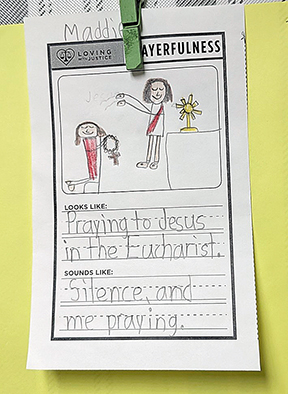
In her new role as coordinator of Catholic mission and culture for the Diocese of Madison Office of Catholic Schools, Kara Roisum spends a lot of time visiting schools around the diocese.
On her journeys, she listens to a string of programs on the Hallow app as well as audiobooks on discipleship.
Most of the time, however, she prays to the Holy Spirit for guidance.
As the newest member of the Office of Catholic Schools, Roisum’s primary responsibility is providing professional development for educators to enrich the culture and nurture the spiritual needs of the school community.
In 2023, Bishop Donald J. Hying of Madison shared several principles for the vitality of Catholic schools.
The first principle describes the importance of staffing schools with teachers whose lives are centered in Christ.
As coordinator, Roisum works closely with principals and teachers to develop the faith community and guide them in discipleship.
“My entire 34-year career has been in Catholic schools,” she remarked, “and I’ve seen and been a part of the good work teachers and principals do every day. However, I’ve also witnessed changes over time that I would say have reached their peak and are overwhelming some of our Catholic school leaders and limiting their ability to nurture their spiritual needs.”
Being able to meet staff’s spiritual needs will enable schools to build a culture focused on mission.
“Schools desire a culture that exemplifies God’s beauty, truth, and goodness. We want to excel in everything we do to mirror our love and right praise of Him.”
Forming the new role
In response to this desire, the Office of Catholic Schools Superintendent Michael Lancaster and Assistant Superintendent Therese Milbrath, collaborated with Bishop Hying to develop the new position within the office.
Roisum was hired in July 2024 to shape the duties and build the process.
She is greatly encouraged by the work she is doing and believes walking joyfully and patiently with others is important in building discipleship.
“It’s so important to meet people where they are at,” she said.
In her work, she hopes to rekindle that sense of wonder and awe of God through engaging conversations to help guide students toward the pathway to Heaven.
“As educators in the Catholic schools, we need to ground ourselves in the mysteries which when you really contemplate them are so awe-inspiring,” stated Roisum.
Feedback and exit surveys from the teachers and principals affirm this lost sense of curiosity in God.
For the 2024-2025 school year, three schools are piloting the new professional development program which will run in a three-year cycle.
The first year is about building trust, vulnerability, and opening communication.
“I learned quickly that I had to be patient and meet educators where they are at,” reflected Roisum.
“I see the potential, but I need to give grace for the Holy Spirit to do His work and engage both the minds and hearts of educators.”
The goal for next year is to continue the work and to add additional schools into the rotation.
Beginning with the 2024-2025 school year, all schools in the diocese were asked to implement virtues education.
It made sense for this program to be woven into the work Roisum is doing as she facilitates the teachers’ efforts to enrich the culture.
Culture can be defined as the spoken and unspoken expression and life of a group, and how the community interacts with each other is one way culture is expressed.
Making changes to the accepted behaviors to improve the culture of a school is challenging for educators, students, and their families.
Doing so means questioning current habits and not only proposing new ones but then communicating and measuring the progress to all community members.
When working with students ages three to 14, a school community must resist returning to old behaviors that are no longer agreeable to the desired culture.
The value of virtues
The decision to teach and practice virtues is not new to Catholic schools.
What is enlightening, however, is what comes out of neuroscience, regarding the value of learning and practicing virtues.
Two Catholic leaders devoted to the study are Sr. John Dominic Rasmussen, OP, and Karen Villa, Ph.D., from Openlight Media.
Their program, Education in Virtue, provides a framework that helps all ages understand how to live a more virtuous life.
In November, the women presented the research and case for teaching virtues.
When taught to children through a Catholic lens, virtues beautifully intersect with each developmental stage.
What makes the difference in using a Catholic lens is the belief in God’s infinite grace and mercy alongside community support.
In other words, because of God’s continued love and forgiveness, in conjunction with a community that strives to walk in His footsteps, students have the hope and assurance that they are never alone or unloved.
This conviction becomes even more crucial as children age and experience challenges in their relationships and experiences.
As Sister Dominic stated at the presentation, practicing virtues is a way of life lived out in community versus a skill that one must master on his or her own.
The work thus far has been positive and illustrates the growth already being observed during sessions.
As one teacher stated “[Collaborating through these activities] will improve the culture of [respect] within the school. Practicing what we preach needs to happen!”
Roisum is filled with hope and excitement for the 2025-2026 school year and for continuing her discipleship and walk with educators.

